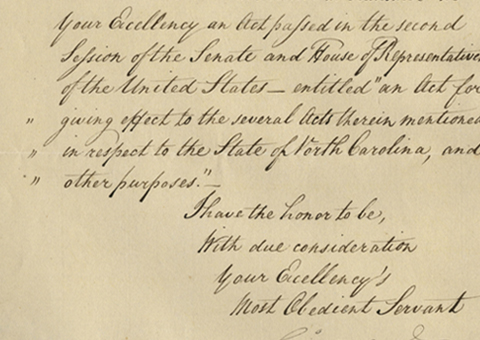Charles Sumner: “Not that I love the Union less but freedom more, do I now in pleading this great cause, insist that freedom at all hazards shall be preserved.”

A signed quotation from his greatest speech, which led to his being caned on the floor of the U.S. Senate by Preston Brook, signed two days after Louisiana seceded from the Union
On February 21, during debate in the Senate, in response to a speech by Stephen A. Douglas, Charles Sumner gave his momentous landmark of freedom speech against the repeal of the Missouri Compromise which prohibited slavery north of 36°30 latitude lineʹ.
Senator Preston Brooks of South Carolina made an impassioned rebuttal against...
On February 21, during debate in the Senate, in response to a speech by Stephen A. Douglas, Charles Sumner gave his momentous landmark of freedom speech against the repeal of the Missouri Compromise which prohibited slavery north of 36°30 latitude lineʹ.
Senator Preston Brooks of South Carolina made an impassioned rebuttal against this speech. This was the genesis of a dispute between the two that would culminate 2 years later. In 1856, President Franklin Pierce announced his support for the corrupt proslavery legislature in Kansas and proclaimed opposition to it treasonable. In May, abolitionist John Brown’s outspoken attacks on that proslavery legislature led a judge to issue warrants for the arrest of him and his sons. On May 21, over 700 border ruffians and proslavery men, waving banners proclaiming the supremacy of the white race, swept down on the antislavery town of Lawrence, ransacking two antislavery presses and burning and looting homes and businesses. Following news of the raid on Lawrence, a friend described Brown as “wild and frenzied.” The next day, May 22, Brooks took his gold-topped cane and, on the floor of the U. S. Senate, clubbed senseless Massachusetts Senator Charles Sumner after he delivered an abolitionist speech, “The Crime Against Kansas.” Sumner was out of commission for some time. The South was jubilant at Sumner getting what he deserved, while the North was furious.This was another stepping stone to Civil War.
In early to mid January 1861 a number of southern states seceded from the Union. On January 26, Louisiana joined them. On the 28th, a woman named Mary W. Sterling approached Sumner on the Senate floor, and asked him to write out and sign this quotation.
Autograph quotation signed, January 28, 1861, a quotation from that great 1854 speech. “Not that I love the Union less but freedom more, do I now in pleading this great cause, insist that freedom at all hazards shall be preserved”.

Frame, Display, Preserve
Each frame is custom constructed, using only proper museum archival materials. This includes:The finest frames, tailored to match the document you have chosen. These can period style, antiqued, gilded, wood, etc. Fabric mats, including silk and satin, as well as museum mat board with hand painted bevels. Attachment of the document to the matting to ensure its protection. This "hinging" is done according to archival standards. Protective "glass," or Tru Vue Optium Acrylic glazing, which is shatter resistant, 99% UV protective, and anti-reflective. You benefit from our decades of experience in designing and creating beautiful, compelling, and protective framed historical documents.
Learn more about our Framing Services








































































































